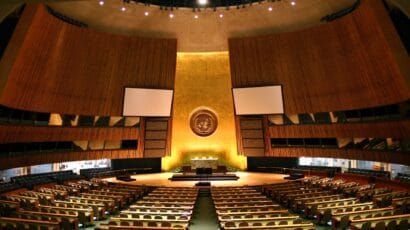Global commons, wicked problem
By Ambuj Sagar, October 8, 2013
Climate change—because of its potential impact on nations, individuals, and ecosystems, and because of the challenges that human beings face in addressing so vast a global-commons problem—is likely to be among the 21st century’s defining issues.
But responsibility for accumulations of greenhouse gases is distributed unevenly. Many nations are significant emitters of greenhouse gases—but some are more significant emitters than others. All nations will suffer the consequences of climate change—but some will suffer more than others. And many of the countries affected most adversely will bear little responsibility for creating the problem.
At the same time, nations have differing capabilities—human, financial, technical, and institutional—to reduce emissions or ameliorate the impacts of climate change. And the scale of the climate problem means that enormous resources are needed to avoid "dangerous anthropogenic interference with the climate system," which is the main objective of the UN Framework Convention on Climate Change (UNFCCC).
This combination of factors makes climate change a "wicked problem"—that is, a very complex problem not susceptible to easy resolution. And the longer action is delayed, the more costly it will become to meet any given climate goal.
So how should countries at various stages of development contribute to addressing climate change? In one sense, the answer is quite straightforward. The Framework Convention, a treaty to which 195 states are parties, requires nations to protect the climate system "on the basis of equity and in accordance with … common but differentiated responsibilities and respective capabilities." The convention specifies that "the developed country Parties should take the lead in combating climate change and the adverse effects thereof."
The approach to climate expressed in the convention has both an ethical and a practical basis. From an ethical point of view, it is only fair that those who contributed most to the problem, and who possess the greatest resources, should bear the greatest burden for addressing it. From a practical standpoint, developed countries are best positioned to marshal the significant, sophisticated capabilities that are required to mitigate climate change. After all, according to 2012 numbers from the World Bank, gross domestic product (GDP) per capita was $1,489 in India and $6,091 in China; it was $46,720 in Japan and $49,965 in the United States. Also, richer countries are generally able to invest a greater fraction of their GDP in research and development.
But developed countries are not really "tak[ing] the lead." Not only have a majority of developed countries failed to reduce their emissions to an adequate extent (in many cases, their emissions have even increased), but developed nations’ appetite for achieving reductions appears very limited. In fact, according to a 2011 report by the Stockholm Environment Institute in which studies of the 2009 Copenhagen Accord and 2010 Cancún Agreement were assessed, the climate mitigation pledges of developing countries exceed (on an absolute basis) the pledges of developed countries.
Strong mitigation policies in developed nations are important for two reasons. First, emissions in these countries must decrease if dangerous climate change is to be averted. Second, mitigation policies in the developed world can create markets for low-carbon technologies, drive down costs, and provide incentives for further innovation.
But given the scale and urgency of the climate challenge, nations at other stages of development also must play a part in addressing the problem—even though many of these countries face major development challenges that require their attention and resources. Fast-developing countries must urgently explore ways to alter the emissions trajectories of their economies, while also remaining mindful of their development challenges; some of these nations may require financial and technical support in order to alter their emissions trajectories. Meanwhile, some countries are already beginning to feel the effects of climate change, and they must begin to develop and put in place climate adaptation plans. This too will require financial and technical support.
Global-commons problems require global cooperation. But climate negotiations have not been particularly successful at engendering cooperation or developing fair, systemic approaches for burden-sharing. Instead, the world had gone down the path of voluntary commitments by individual nations. This, as a form of cooperation, is weak and ineffective indeed—and so far, as detailed in the report by the Stockholm Environment Institute, the combined mitigation pledges of the developed and developing worlds do not constitute action on the scale that is needed to avoid dangerous climate change.
Will parties to the Framework Convention stay true to its objectives and principles, or will they abandon those objectives and principles for the sake of political expediency? I certainly hope it is the former. Will the community of nations manage to develop a paradigm of cooperation that makes possible a fair and effective solution to the climate problem? I certainly hope so. But only time will tell.
Topics: Climate Change
Share: [addthis tool="addthis_inline_share_toolbox"]














